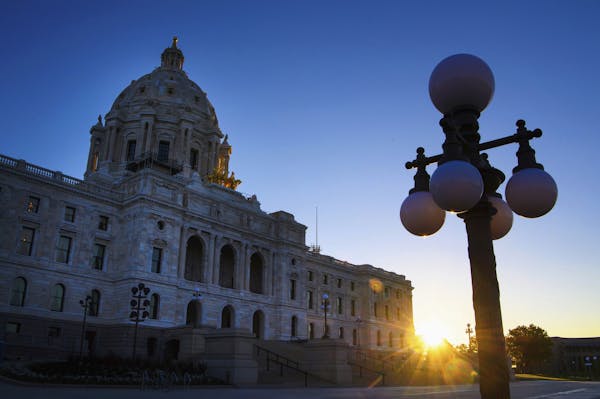Minnesota's next governor will take office as public schools around the state face millions of dollars in budget shortfalls as well as a continued gap in classroom performance between students of different races that's among the largest in the nation.
Traditionally, education has been a top priority for Minnesota voters, and that's likely to come into play as voters decide whom to support in the DFL and GOP primaries for governor next Tuesday. And issues such as school finance, curricula and preparing the future workforce have historically been some of the most pressing subjects that governors confront.
Shared priorities have emerged among the five leading candidates competing for the job. DFLers and Republicans alike have championed technical education and said they want to put students on the path to jobs in high-demand fields. They also want to close the persistent achievement gaps between students of color and their white peers on standardized test results and in high school graduation rates.
But while some candidates said they would continue DFL Gov. Mark Dayton's goal of expanding early childhood education on the road to universal prekindergarten, others said it's time for a new approach to reduce the achievement gap.
"Let's try some things we haven't been doing," said Hennepin County Commissioner Jeff Johnson, who is running against former Gov. Tim Pawlenty in the Republican primary. "In particular, let's give parents more choices and let's give them more control over the schools that their kids already go to."
Related
Get your Morning Hot Dish

Johnson said providing families with vouchers or tax credits to help afford sending their child to another school is a good option, along with passing a "parent trigger" law. A number of states have such laws, which allow families to have a referendum on a school and potentially force major changes such as turning it into a charter school.
Pawlenty said he also supports school choice and a parental trigger option. Both he and Johnson have said when it come to early education, they prefer targeted early learning scholarships rather than the statewide expansion that Dayton has pushed. The state should prioritize families in need, Pawlenty said, and proposals such as universal prekindergarten would not do that.
The DFL primary candidates — state Rep. Erin Murphy, Attorney General Lori Swanson and U.S. Rep. Tim Walz — have all emphasized the need for more money for schools. Support for education has not kept pace with inflation, DFLers said.
"The inflationary game has got to stop. That is a gimmick. It is unfair," said Walz, a former high school teacher in Mankato.
This week, Walz debuted his plan to improve Minnesota schools, which included accounting for inflation in future education budgets and reducing class sizes. He did not have a specific goal for what class sizes should be and said that would be determined by the district. He also wants to increase the amount of levy assistance the state provides to school districts that do not have a wealthy property tax base to draw from.
Education Minnesota, the union representing teachers and some other school staff, endorsed Walz.
"Congressman Walz is one of us. He's a 20-year educator, who knows firsthand what educators need and what students need," Education Minnesota President Denise Specht said.
Walz and other gubernatorial candidates have not said how much their proposals would cost. But Walz said he would want to start by essentially auditing Minnesota's education system and then telling residents how much it would cost to make the changes people want. K-12 education already makes up the biggest portion of spending by the state of Minnesota, comprising 41 percent of total spending in the current two-year budget cycle.
Swanson's campaign also provided more details this week about her vision for education. She would tackle the achievement gap by recruiting diverse teachers and supporting early childhood education and prekindergarten programs, campaign staff said in an e-mail, noting that a dollar invested in early childhood education for low-income children pays dividends down the road.
Swanson's administration would secure more research grants for colleges and universities and work to make college more affordable, her campaign said, though it did not give details about how she would address tuition. Last week Swanson said she would create a position to coordinate training and career pathways for students in technical fields such as construction, information technology and health care.
"Education is the way that people separate themselves from the circumstances of their birth and move up the economic ladder, and my administration will support education at all levels," she said.
Both Swanson and Murphy have highlighted the need for more school counselors.
At a recent news conference about her education plan, Murphy said larger class sizes and the lack of school nurses and counselors show that school funding has not kept pace with inflation.
"We need to catch up with that funding and yes, we will make an ongoing, durable investment in our public schools across the state," she said.
Murphy, the DFL-endorsed candidate, stood next to Dayton as she laid out her education agenda after the two toured a Head Start program in St. Paul. She vowed to continue Dayton's efforts to expand early childhood education.
Every year, Dayton has increased state funding for education. But Gary Amoroso, executive director of Minnesota Association of School Administrators, said the state still has not caught up with the rate of inflation since the early 2000s.
"School districts had to make tough choices about staffing, about programming," he said.
Pawlenty's spokesman, Sam Winter, noted that school funding increased in every budget during Pawlenty's eight years as governor. Both claims are possible, because schools often struggle to keep up due to increasing costs, such as teacher salaries.
Pawlenty governed during the recession and faced significant budget shortfalls, and Winter said districts were expected to tighten their belts. But he said if elected, Pawlenty would increase K-12 funding while holding schools accountable.
Jessie Van Berkel • 651-925-5044






